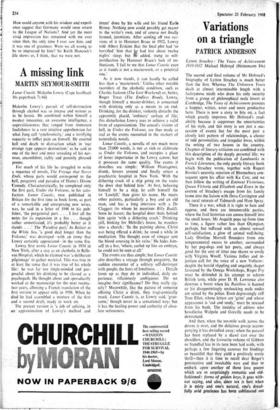A missing link
MARTIN SEYMOUR-SMITH
Lunar Caustic Malcolm Lowry (Cape hardback 16s paperback 7s 6d)
Malcolm Lowry's pursuit of self-destruction through alcohol was so intense and serious as to be heroic. He combined within himself a modest innocence, an awesome intelligence, a superstitiousness that ranged from immature foolishness to a rare intuitive apprehension for what Jung call `synchronicity,' and a terrifying capacity to inflict pain on himself. He courted hell and death to distraction which in 'our strange type appears destruction,' as he said in one of the best and most revealing of his ner- vous, unconfident, richly and potently phrased poems.
For much of his life he struggled to write a sequence of novels, The Voyage that Never Ends, whose parts would correspond to the hell, purgatory and paradise of Dante's Divine Comedy. Characteristically, he completed only the first part, Under the Volcano, to his satis- faction. Lunar Caustic, now published in Britain for the first time in book form, as part of a remarkable and enterprising new series, was, he said in a letter of 1946 to his pub- lisher, 'the purgatorial part. . . . I lost all the notes for its expansion in a fire . . . though rather unmotivated, it's probably better as it stands. . . .' The Paradiso part,' In Ballast to the White Sea, 'a good deal longer than the Volcano,' was destroyed—with an irony' that Lowry certainly appreciated—in the same fire.
Lowry first wrote Lunar Caustic in 1934 in New York, after a stay as an alcoholic in Belle- vue Hospital, which he claimed was 'a deliberate pilgrimage' to gather material. This was true in at least the sense that it was true of his whole life: he was far too single-minded and pur- poseful about his drinking to be classed as a psychopath. He thought about and sporadically worked at the manuscript for the next twenty- two years, allowing a French translation of the first version to appear only in 1956. When he died .he had assembled a mixture of the first and a second draft, ready to work on.
The present version is 'a job of splicing, in an" approximation of Lowry's method and
intent' done by his wife and his friend Earle Birney. Nothing now could possibly get nearer to the writer's own, and of course not finally formed, intentions. After sending off two ver- sions of it to Harcourt Brace in 1952, Lowry told Albert Erskine that the final plot had 'so horrified' him that he had lost about twelve nights' sleep; but BP added, stung to self- justification by Harcourt Brace's lack of en- thusiasm, `I fail to see that Lunar Caustic even as it stands is not a masterwork, or a potential one.'
As it now stands, it can hardly be called less than a 'masterwork.' Unlike other notable recorders of the alcoholic condition, such as Charles Jackson (The Lost Weekend) or, better, Roger Treat (The Endless Road), Lowry, though himself a master-drinker, is concerned with drinking only as a means to an end. Drinking, for the drinker, violently disturbs the apparently placid, 'ordinary' surface of life; this disturbance Lowry uses to achieve a valid form of expressionism. The consul's visions of hell, in Under. the Volcano, are thus made as real as the events recounted in the starkest of naturalistic novels.
Lunar Caustic, a novella of not much more than 25,000 words, is not as rich or elaborate as Under the Volcano, and occupies a place of lesser importance in the Lowry canon; but it possesses the same quality. The events it describes are simple: William Plantagenet, drunk, hovers around and finally enters a psychiatric hospital in New York. 'With the dithering crack of a ship going on the rocks the door shut behind him.' At first, believing himself to be a ship, he calls himself the ss `Lawhill,' then gives his name. He Meets other patients, particularly a boy and an old man, and has a long interview with a Dr Claggart (to whom he mentions Billy Budd). Soon he leaves; the hospital door shuts behind him again 'with a dithering crack.' Drinking still, looking for Melville's house, he wanders into a church: 'In, the painting above, Christ was being offered a drink; he stood a while in meditation. The thought even of vinegar sent the blood coursing in his veins.' He hides him- self in a bar, 'where, curled up like an embryo, he could not be seen at all.'
The events are thus simple; but Lunar Caustic also describes a voyage through purgatory, the sudden encounter of a solitary self-destroyer with people, the fears of loneliness. . . . Details loom up as they do in individual, daily ex- perience, villainously ambiguous. •Do we imagine their significance? Do they really sig- nify? Meanwhile, like the picture of someone offering Christ a drink, they tragi-comically mock. Lunar Caustic is, as Lowry said, 'grue- some,' though never in a sensational way; but it has the healing power and authority of abso- lute seriousness.


































 Previous page
Previous page